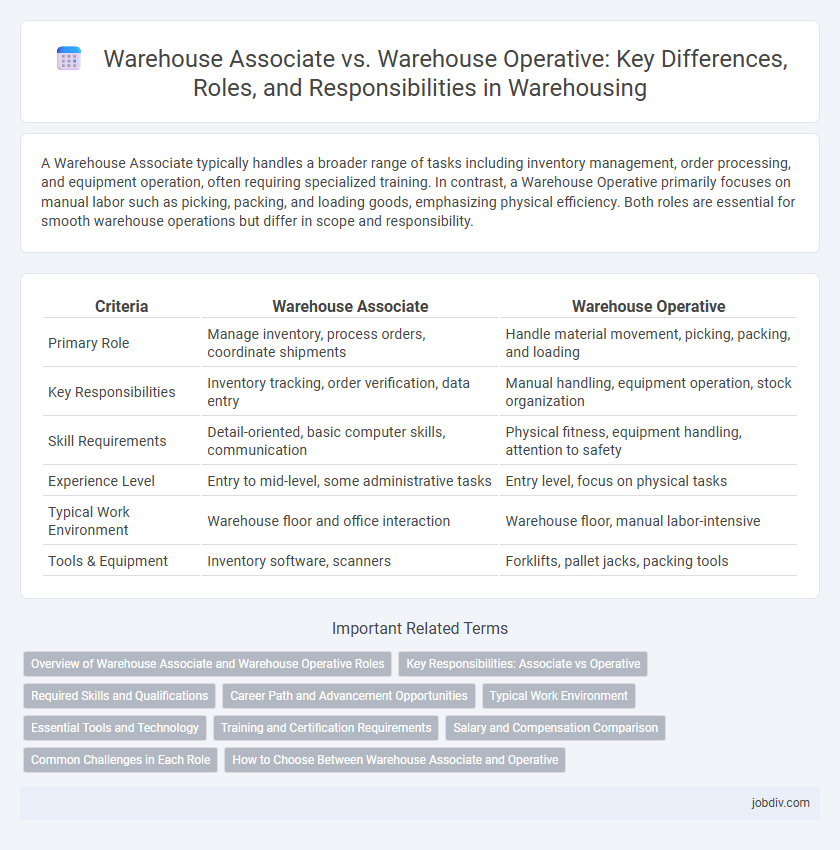A Warehouse Associate typically handles a broader range of tasks including inventory management, order processing, and equipment operation, often requiring specialized training. In contrast, a Warehouse Operative primarily focuses on manual labor such as picking, packing, and loading goods, emphasizing physical efficiency. Both roles are essential for smooth warehouse operations but differ in scope and responsibility.
Table of Comparison
| Criteria | Warehouse Associate | Warehouse Operative |
|---|---|---|
| Primary Role | Manage inventory, process orders, coordinate shipments | Handle material movement, picking, packing, and loading |
| Key Responsibilities | Inventory tracking, order verification, data entry | Manual handling, equipment operation, stock organization |
| Skill Requirements | Detail-oriented, basic computer skills, communication | Physical fitness, equipment handling, attention to safety |
| Experience Level | Entry to mid-level, some administrative tasks | Entry level, focus on physical tasks |
| Typical Work Environment | Warehouse floor and office interaction | Warehouse floor, manual labor-intensive |
| Tools & Equipment | Inventory software, scanners | Forklifts, pallet jacks, packing tools |
Overview of Warehouse Associate and Warehouse Operative Roles
Warehouse Associates and Warehouse Operatives play essential roles in logistics and supply chain management, with Warehouse Associates typically handling inventory management, order picking, and data entry using warehouse management systems (WMS). Warehouse Operatives focus primarily on physical tasks such as loading and unloading goods, packaging, and maintaining a clean and safe warehouse environment. Both roles require attention to detail, adherence to safety protocols, and the ability to work efficiently in fast-paced settings.
Key Responsibilities: Associate vs Operative
Warehouse Associates typically handle inventory management, order picking, packing, and shipping documentation, ensuring accuracy and efficiency. Warehouse Operatives focus more on manual tasks such as loading and unloading goods, organizing stock, and maintaining the cleanliness and safety of the warehouse environment. Both roles require teamwork and adherence to safety protocols but differ in the level of responsibility and scope of operational tasks.
Required Skills and Qualifications
Warehouse Associates typically require strong organizational skills, proficiency in inventory management software, and experience with logistics coordination, often necessitating a high school diploma or equivalent. Warehouse Operatives usually need physical stamina, ability to operate forklifts or pallet jacks, and basic knowledge of safety protocols, with on-the-job training being common. Both roles demand attention to detail, teamwork, and adherence to warehouse health and safety standards.
Career Path and Advancement Opportunities
Warehouse Associates often engage in inventory management and order fulfillment with opportunities to advance into supervisory roles or specialized logistics positions. Warehouse Operatives typically perform manual tasks such as loading, unloading, and packing, with career progression leading to team leader or shift supervisor roles. Both paths offer skill development in warehouse management systems and operational efficiencies, enhancing long-term career growth.
Typical Work Environment
Warehouse Associates and Warehouse Operatives typically work in fast-paced fulfillment centers, distribution hubs, and storage facilities where inventory management and order processing are critical. These roles involve physically demanding tasks such as loading, unloading, sorting, and packaging goods in temperature-controlled or ambient warehouse environments. The work environment requires adherence to safety protocols, use of forklifts or pallet jacks, and collaboration within teams to ensure efficient supply chain operations.
Essential Tools and Technology
Warehouse Associates and Warehouse Operatives utilize essential tools like barcode scanners, pallet jacks, and inventory management software to optimize operations. Warehouse Associates often engage with advanced technology such as warehouse management systems (WMS) and automated picking tools to enhance accuracy and efficiency. Both roles depend on RFID technology and handheld devices to streamline inventory tracking and reduce errors in warehousing processes.
Training and Certification Requirements
Warehouse Associates often require formal training in inventory management systems and may need certifications such as OSHA Forklift Operator License to handle equipment safely. Warehouse Operatives typically undergo on-the-job training emphasizing manual tasks like picking, packing, and loading without mandatory formal certifications. Employers prioritize specific skill certifications for Associates, while Operatives receive practical training to meet operational needs efficiently.
Salary and Compensation Comparison
Warehouse associates typically earn an average hourly wage ranging from $14 to $18, while warehouse operatives receive between $13 and $16 per hour, varying by location and experience level. Compensation packages for warehouse associates often include performance bonuses and health benefits, which may be less common for warehouse operatives. Salary differences also reflect job responsibilities, with associates usually handling more administrative tasks, contributing to higher pay.
Common Challenges in Each Role
Warehouse Associates often face challenges such as managing inventory accuracy, improving order fulfillment speed, and maintaining safety compliance during loading and unloading. Warehouse Operatives typically contend with physically demanding tasks, time-sensitive picking and packing responsibilities, and navigating fluctuating workloads while ensuring quality control. Both roles require adaptability to technological systems like warehouse management software and effective communication to coordinate team efforts.
How to Choose Between Warehouse Associate and Operative
Choosing between a Warehouse Associate and a Warehouse Operative depends on the specific skill set and job scope required, as associates often handle inventory management, order processing, and supervisory tasks, while operatives focus more on manual labor, such as picking, packing, and loading. Analyzing the company's operational needs and the desired level of responsibility helps determine the appropriate role. Employees seeking advancement opportunities may prefer the Warehouse Associate role due to its broader scope in logistics and coordination.
Warehouse Associate vs Warehouse Operative Infographic

 jobdiv.com
jobdiv.com